#Moe-P
Explore tagged Tumblr posts
Text



I‘m a harmfully villainous person who is not free of any emotions and feelings you imbecile potato!
#digital drawing#the amazing world of gumball#0x00000#void#crayon shin chan#クレヨンしんちゃん#kazama toru#kazama#Moe-P
3 notes
·
View notes
Video
tumblr
Rob and Moe deserve an Emmy for their voice acting this episode. Definitely the hardest I’ve laughed at a patb segment in the reboot.
#pinky and the brain#patb spoilers#animaniacs spoilers#The Orson Welles bit lmao#a little gift for Moe I see :p#this whole episode was so good fr#the way Brain has no choice but to give it his all lol
2K notes
·
View notes
Text





9.0" UK MoD
- RS
#RailScales#HTP Scales#HTP XOS#XOS-W#XOS-H#Karve-P#QDX#MonoLift Riser#MonoLift#Sig Sauer#MCX-SPEAR LT#MCX#9.0" 300 BLK SPEAR LT#SLX762C-QD#Romeo8T#Juliet4#Poi Tac#ST-MCX#Magpul 300BLK PMAG#MOE+ Grip#CTR Stock#M-LOK#Profoto
100 notes
·
View notes
Text

she doodled on me till i bopped
#the doodlebops#doodlebops#the sudden primal urge i had to draw them cannot be explained#ok now onto the other like 12 quirky bands from 2000s childrens media#shumm's art#medibang paint pro#i really like how rooney came out omg#did this fucking drawing just help me learn how to draw humanoids in my style....#digital art#drawing#nostalgia#how do i tag this#athena p.....#dont let this flop gang this took me 6 hours#moe doodle#rooney doodle#deedee doodle
299 notes
·
View notes
Text

P-chan x Ame-chan ꒰⑅ᵕ༚ᵕ꒱˖♡
I've never seen a fanart of them kissing so I delivered (◠‿・)—☆
For my girlypops I've cropped the drawing to make matching pfps <3




#artists on tumblr#p chan#ame chan#ame chan nso#nso ame#needy girl overdose#needy streamer overload#ame needy streamer overload#moe art#yuri couple#2000s anime style#2000s anime art#nso fanart#bpd love#obslove#obsessive yandere#obsessive love#yancore#jirai girl#ame chan fanart#obsessivecore#yuri art#toxic yuri#jirai joshi#needy pic#jirai kei#jirai onna#moe artstyle#2000s moe#moecore
28 notes
·
View notes
Text
P&SwG x Artiswitch
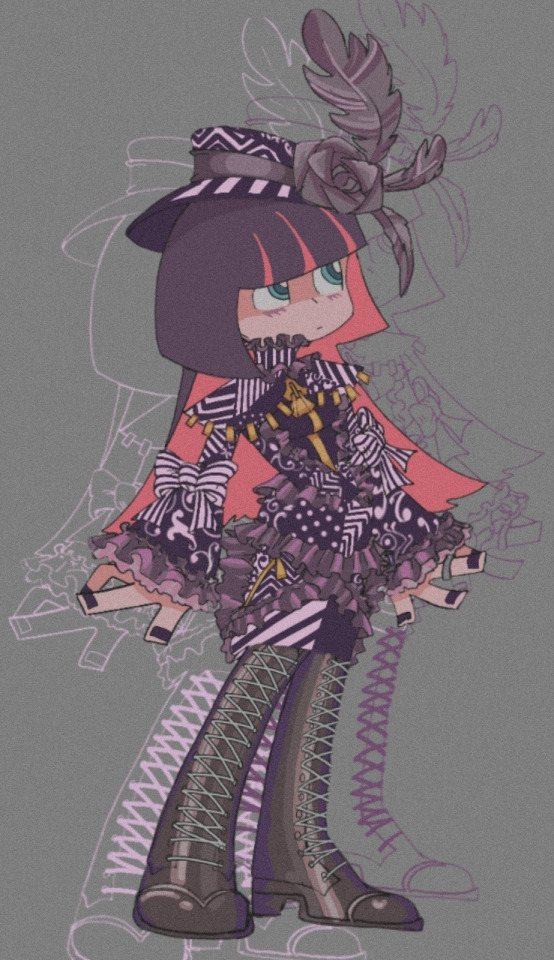
Something I did for Cringetober2023, absolutely loved the result, I'm just obsessed with Lulu's dress.
#p&swg#panty & stocking with garterbelt#stocking anarchy#stocking anarchy fanart#lulu#lulu fanart#artiswitch fanart#artiswitch#ruru#ruru fanart#crossover#cringetober 2023#fanart#digital drawing#digital art#ghost food#moe shop
182 notes
·
View notes
Text

41 notes
·
View notes
Note


Maybe you could draw the Robo Gang (Robo Sleuths)? :)

HERE U GOOO💗💗💗💗
#sorry the pic is p basic 6 characters is a lot to put in one image for me...hope u still like it tho!!#I LOVE THESE GUYS SM U HAVE NO IDEA the concept alone of robot detectives is great SO DONT GET ME STARTED ON UR CHARACTERS#every character u come up w is always so very charming i love em all#art#my art#ask#fanart#I JUST REALISED LOU IS HOLDING UP MOE AND IT WASNT THE SHIRT HE WAS WEARING IN THAT ONE PIC SORRY AB THAT
39 notes
·
View notes
Text
Would you like some strangely elaborate specific ass headcanons? Of course you do!!!! Also I'm outsourcing a very specific dilemma. But you have to Learn My Methods first. Okay? Okay!!!!
PIERCINGS. AS STORYTELLING DEVICES. GO!!!!
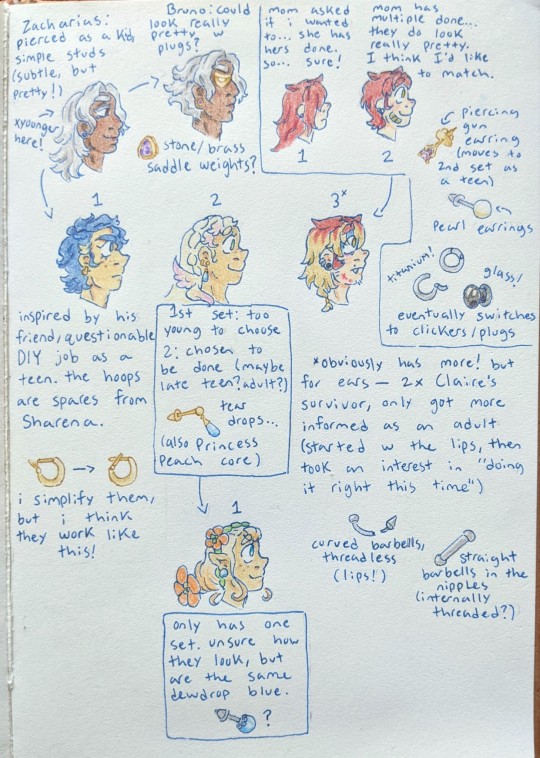
Okay! So what the hell are we looking at and what exactly am I trying to determine, here? Well!!! There's a few different facets to this.
FIRST OF ALL. REALLY REALLY CUTE AND ALWAYS SO FUN TO ME
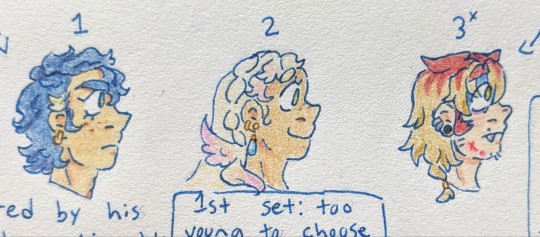
One, two, three!!! They're a set of three, and they're marked as such by how many sets of piercings they have in their ears. It's such a small detail that happened more by coincidence than intent, but it makes drawing all three of them together feel coherent and again, fun! I also really like the storytelling/contrast of the Askr siblings having golden jewerly, while Moe's is in silver (it does mix silver and gold more broadly -- but I'm talking just the face/ears here!). You get the sense (... in addition to Moe's more scruffy appearance in general), that one is from a more "common" background.
Okay, but what's all that text? STORYTELLING.... 2
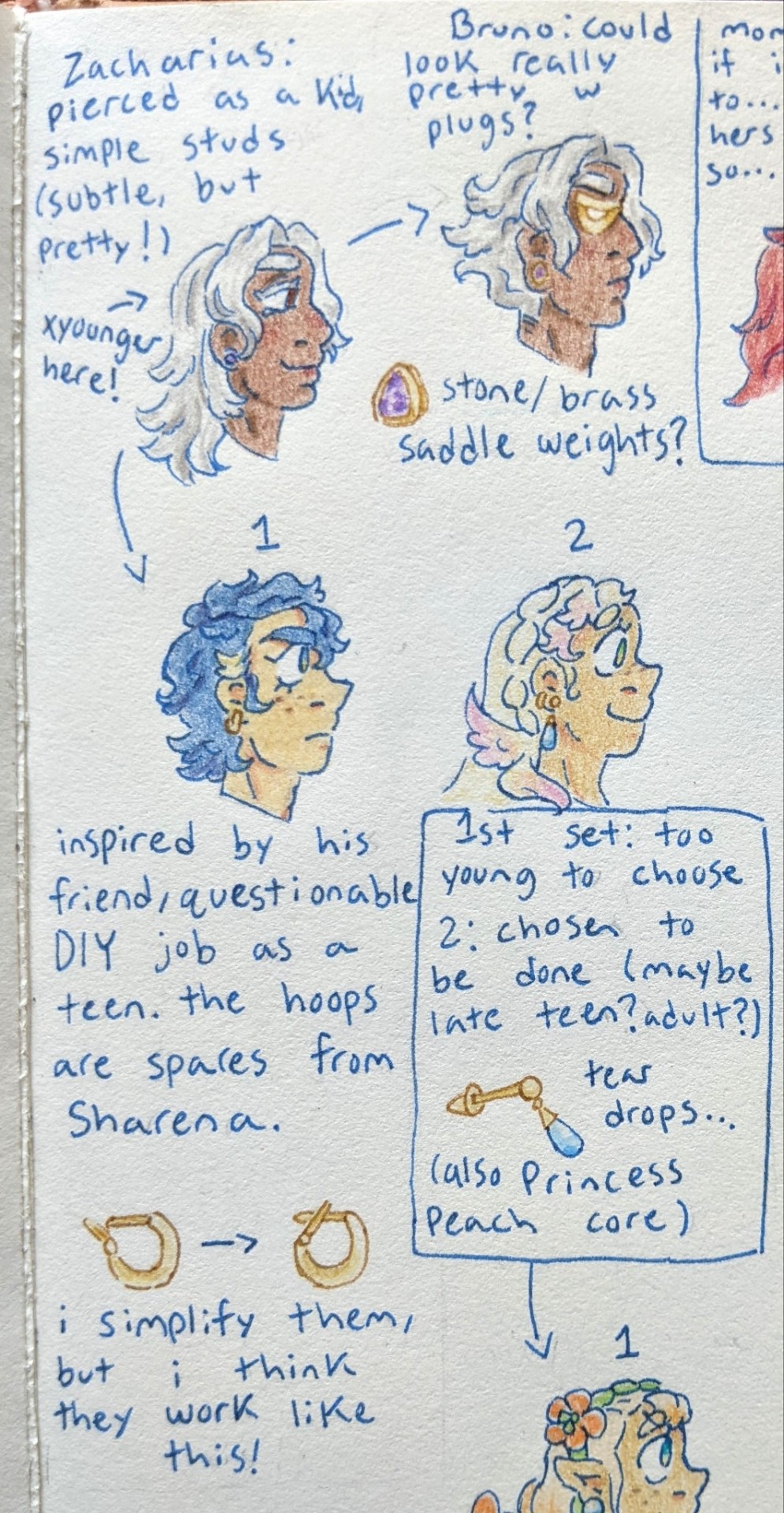
Piercings, as a way to indicate connections to other characters, and to imply background information.
First example, it's noted that Bruno has had his in for a long time (... kind of regretting the specificness of "as a kid". That's supposed to have implications, but tbh it may be more fitting for Bruno as a whole to simply have said, "A Long Time"). He wears something modest, maybe a common stone, but still eye-catching. I like to think Alfonse became enamored with it (guys can also do this???), same way he was completely smitten by all of Zacharias. One extremely questionable piercing job courtesy of Zacharias himself and egged on by Sharena (who made a generous donation and/or sacrifice from her own jewelry box) later, it's a miracle he managed to heal them. Equally impressive is how long he managed to hide them as a teenager.
Meanwhile, you see Sharena's example is pretty straightforward! Assigned ear-stabbing at birth. It worked out well, though! Aside from that one time where her piercings mysteriously closed up and they had to be re-done, when she was little. Which could mean nothing. Alls well that ends well! In fact, she liked the look so much she decided to get another set done! Which may or may not come back later...
I will admit, the saddle plugs on Bruno were an impulse decision I made drawing this out (so not a super strong design headcanon, and maybe I could draw it better w more practice tbh, test run ect ect), BUT. MORE IMPORTANTLY. That idea, AND NEXT UP: STORYTELLING... 3.
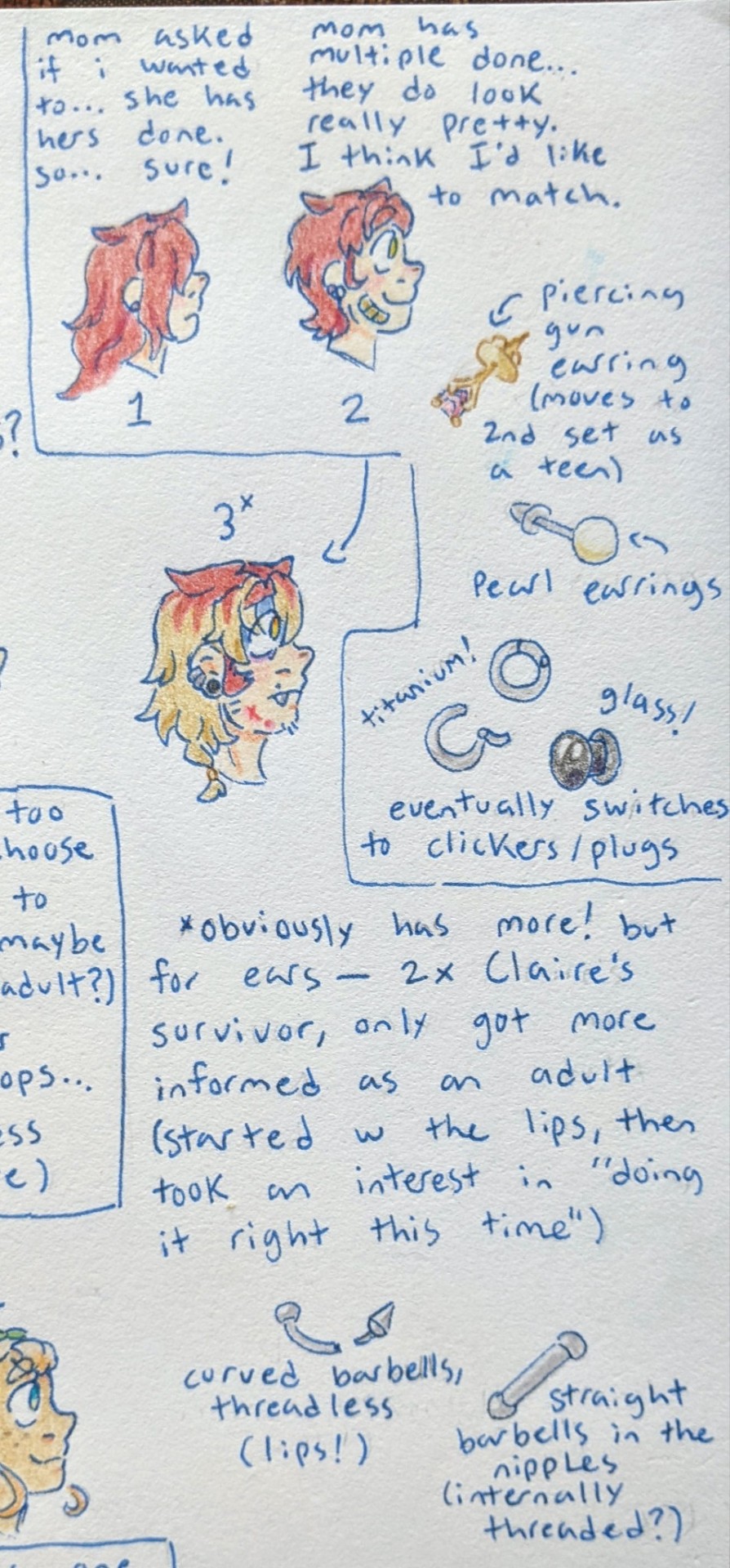
On top of noting significant connections and providing background information -- here, you have gaining more and/or doing different Things with your piercings, as a way to indicate the passage of time or a change of taste. Woah, that's a lot of text! That's just my autism showing, I'll do you a favor -- with Moe specifically, the biggest takeaway here is:
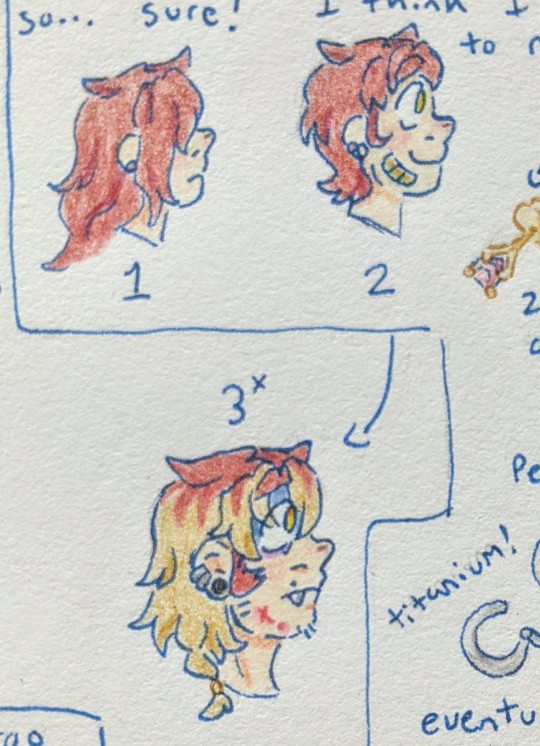
One, two, three. There are other iderations of Moe of course, plenty of awkward in-between stages. But as I've developed it, I've found that there's like... three really plot relevant parts of its life. One easy to forget, two OH GOD OH FUCK, three that's the guy who lives here now. AWESOME!!!!
OKAY. OKAY. PEONY she has BEEN HERE THIS WHOLE TIME. What's up with that?

So we have background implications/information, we have connections to other characters, and NOW. WE HAVE. Paths that diverge. Sharena, 2. Peony, 1. Plus, a little bit of shape language with those tear drop earrings... on Sharena specifically...... ohghhghhf........
I've always been really indecisive with my Peony designs (for some reason it has been SUCH A STRUGGLE FOR ME), but I do like the simplicity of this one actually. The "Princess Peach core" note about Sharena is more about her color palette, but after writing that I went You know what. Fuck it *gives Peony Princess Peach earrings*. This does feel subject to change, but the idea they could be like water droplets is so cutes... I have really wanted to give Peony earrings with a blue gem though, BECAUSE...
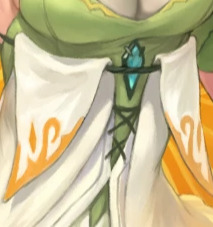
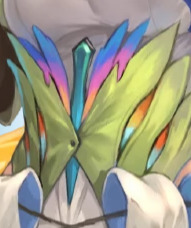
The blue and silver are a nod to this reoccurring detail on Peony! So not only does it tie back to Sharena (IMPORTANT), it also (theoretically.) ties together nicely overall!!
Okay. So. Where does this leave me. Why did I draw all this out? All these little details that exist in my mind, why did I go out of my way to create this elaborate in-depth demonstration? Remember when I said I was gonna outsource some shit?
PROBLEM: I NEVER. EVER. EVEEEERRRRRR KNOW WHAT TO DO WITH LIF'S EARRINGS‼️‼️‼️‼️‼️‼️‼️‼️‼️‼️ AND THE LACK OF DIRECTION IS BECOMING MORE AND MORE GLARING EVERY FUCKING TIME I DRAW HIM‼️‼️‼️‼️‼️‼️
And what prompted all of this. What REALLY made me Think About This. I did another "ehhh Fuck It" with Lif's piercings, where he's sharing a panel with Moe, and
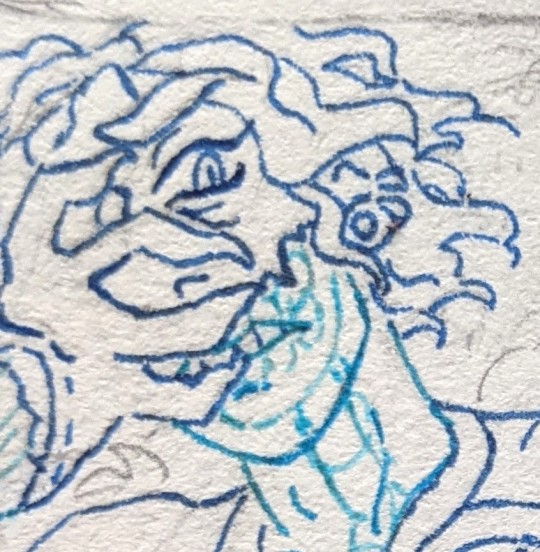

Ooughgughfhghhh...... them having the same earring arrangement.
But then. Then. I got autism brained about it. I can see Bruno having fuck all time to stretch his ears while on some gayass journey (... the. Timelines. Time in between Events. Maybe he wouldn't have full big stretched ears in Book 1. HOWEVER). Inconvenient, maybe, but if he's dedicated to the grind. He can do it. And I mean, have you seen his muscles? Dude CARES about his appearance. Meanwhile Moe ABSOLUTELY had fuck all time to stretch its ears before arriving in Askr. Then I'm thinking about Alfonse. NEVERMIND how much time it takes to stretch your ears, I'm thinking about the Number Rules. I'm thinking about how he's One, the first guy of a set of Three. I'm thinking about the Number Rule, to indicate Time. Why WOULD he have Three? The Number Rule, as Paths Diverging. There's Two of him, not Three. ALSO ASKING MYSELF "Would Alfonse get more piercings???" LIKE NO. BECAUSE. THE. THE RULE OF THREE. THE ONE TWO THREE. WERE YOU EVEN LISTENING‼️‼️‼️‼️‼️‼️‼️‼️‼️😭😭😭😭😭😭😭😭😭😭😫😫😫😫😫
Idk am I just insane. Am I a lost cause. Lif's ears are usually covered up by his long shaggy hair anyway. But really that does just make any time any piercings Would be visible, just. I am just so deeply conflicted torn between Goth Alt Men Hot and THE METHODS‼️‼️‼️‼️‼️ THE STORYTELLING THE METHODS MY DEEPLY INTRICATE RITUALS‼️‼️‼️‼️‼️‼️‼️‼️💥💥💥💥💥💥💥💥💥💥💥💥
#fire emblem#feh#bro why do i have the intricate piercing hc autism................... of all flavors of autism..........#like even within my special interest. i am on some NICHE bullshit. all of yhe fucking time.#the number rules only go for ear piercings. btw. if that fucking means anything#do you wanna hear more oddly specific piercing hcs.#something i lowkey regret my most recent summer sharena is i think it would have been cute to give her a navel piercing#and it was be soooooo funny. of both askr siblings were like. okay well i want a hidden piercing actually.#again like almost we got the rule of threes here too. if we were to fuse them we would have one fully decked out guy.#* most recent summer shari being the one i did for sharena week! it's like a year tradition for me... to draw a Her..#anyways i spent so long typing yhis up and i haven't even done text transcribs yet. goodbye forever.#fe alfonse#sharena#fe bruno#fe peony#fe lif#moe tag#summoner oc#moe ref#yeah sure actually. i'll file this under that. you get a p good look at its piercing arrangements at least#past and present.#now the real question is do i tag mani... that's... moe isn't it? but the same rings true for mani. aesthetically.#eh.#mani tag#my art
14 notes
·
View notes
Text


we’re trapped in here . . . we’re trapped in here for good i’m lost in here . . . i’m lost in here with you together, through and through
#moe art#moe artstyle#vocaloid#2000s#hatsune miku#2000s art#miku#moecore#2000's art#luka#megurine luka#deja vu#circusP#circus p#jpop
11 notes
·
View notes
Text

ame and p chan / pien girl <3
13 notes
·
View notes
Note
Sorry for the random question, but what is Fields of Mistria? I've been curious but haven't had the time to look into it.
Sorry for the delay - it's a farming game on Steam (like SDV, RF, and HM/SoS). Currently it's in early access and will have features and stuff added over time - such as right now heart levels can cap off at 4 (and will increase with more events added over time which should end up reaching 10).
It's been enjoyable what I've played and the characters are really charming! And like SDV/RF there is some combat in addition to farming + there's a museum like in SDV/SoS. So it's a lot of features but not everything is fully released.
#moe talks a lot#not art#fields of mistria#idk how helpful that is and its a p quick google search but hope it helps?
11 notes
·
View notes
Text
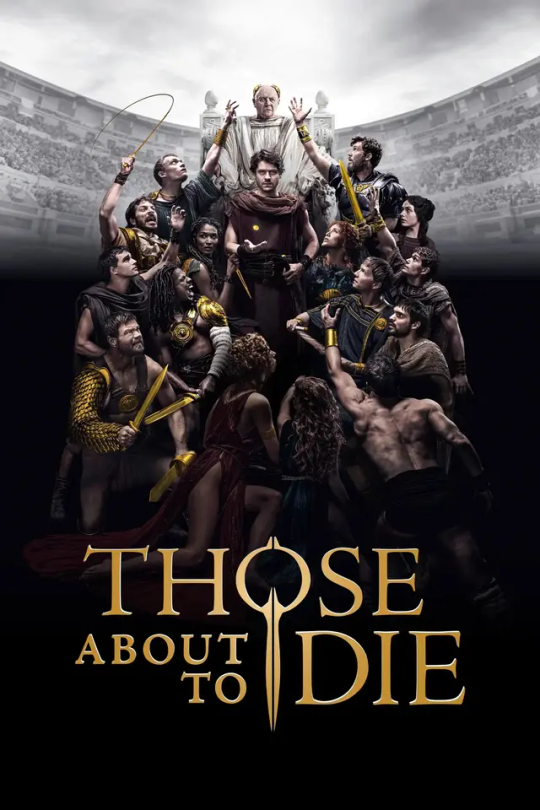
Hello everyone!
We're meeting again today to talk about a show that's very different from the ones I'm used to reviewing, but more importantly, different from the ones I'm used to watching, so I just wanted to thank you for the opportunity you've given me and for choosing it in the poll on Instagram (@theaddictedwatcherrewiews) last Saturday. The series I'm about to tell you about is an adaptation of Daniel P. Mannix's 1958 book of the same name, which was re-released in 2001 as The Way of the Gladiator. The book is said to have inspired David Franzoni's screenplay for Ridley Scott's Gladiator (2000). The series' release on Prime Video at the end of July this year could also suggest that it is paving the way for the release of the film Gladiator 2, scheduled for November 2024. As some of you may have guessed, I'm going to tell you about Those About To Die.
And as usual, a short synopsis : Rome, year 79, a few years after the death of Princeps Senatus Nero. The population is tired and bored. Some are starving, mainly because of the slow arrival of grain from Egypt. The ageing princeps Vespasian, who had initiated the construction of the Flavian amphitheatre, tried to distract and entertain the people with gladiatorial fights and chariot races. All this kept many people busy behind the scenes, providing a real 'spectacle' for the people. The new amphitheatre also provoked jealousy among the Roman elite, who resented Vespasian's desire to share the site with the people. Vespasian also had to deal with the rivalry between his two sons, Titus and Domitian. Against this backdrop, we follow the fate of Tenax, a man who starts from nothing and tries to reach the upper echelons of Roman society. Along the way, he crosses paths with Cala, a mother who has come from Numidia to recover her three children, who have been forced into slavery and transported to Rome. And now a short technical presentation: - Created by : Robert Rodat - Music by : Andrea Farri - Starring: Iwan Rheon, Sara Martins, Tom Hughes, Jojo Macari, Moe Hashim, Jóhannes Haukur Jóhannesson, Rupert Penry-Jones, Gabriella Pession, Dimitri Leonidas, Emilio Sakraya, David Wurawa, Pepe Barroso, Gonçalo Almeida, Eneko Sagardoy, Lara Wolf, Anthony Hopkins.
As I said at the beginning of this article, this series is an adaptation of the novel Those About to Die by Daniel P. Mannix (1958, reprinted 2001) by Robert Rodat, the man behind films such as Saving Private Ryan (1998) and the Falling Skies series (2011), both directed and produced by Steven Spielberg.
In this work, which takes the form of a peplum, we find many of the codes found in other well-known productions such as the films Gladiator (2000), Spartacus (1960) and Ben-Hur (1959), as well as the series Rome (2005) and Spartacus (2010), to name but a few. The title of the work is a direct reference to the Latin salute given to the princeps during the games: Ave Caesar, morituri te salutant, which translates into English as 'Hail Caesar, those who are about to die salute you'. It's a quotation that is used almost systematically in all types of works dealing with gladiatorial fights, chariot races and, more generally, the Roman arenas, as in the comic strip Asterix Gladiator by Albert Uderzo and René Goscinny (album published in 1964).
But let's stop for a moment. What is a peplum? The Latin name peplum is derived from the ancient Greek word péplos, meaning 'cloth used to cover the body to make a toga'. Since the twentieth century, it has been used to describe a genre of historical fiction films set in antiquity, particularly ancient Rome, ancient Greece and ancient Egypt. There are also biblical epics based on the Old or New Testaments. Its place in the history of cinema is proof of its importance. At once noble - because it deals with history and religion and uses authors such as Homer (The Iliad, The Odyssey) or Gustave Flaubert (Salammbô) - and vulgar, because it exploits violence and eroticism, the ancient genre is associated with epic, comedy, fantasy and even the miraculous through its use of various mythologies. The basic recipe for the American peplum was laid down by Cecil B. DeMille: a handsome hero, preferably muscular, a beautiful heroine, spectacular action (orgies, battles), lavish sets and costumes.
Now that we've looked at the genre, let's take a brief historical look at the characters and the various themes.
BACKGROUND
Before we begin, this section will probably contain some historical spoilers about some of the main characters, but you need to know a little history to understand what's at stake.
Although the series begins in 79 AD, under the reign of Princeps Vespasian, we need to go back a little to understand the socio-political context of the time.
Before Vespasian
After the death of Nero in 68, the Roman Empire plunged into civil war, known as the Year of the Four Emperors, and power was hotly contested, leading to a highly unstable political situation. While the usurper Vitellius took power during 69, the Roman legions in Egypt and Judea declared Vespasian emperor on 1 July 69. He marched on Rome with his larger legions and defeated Vitellius, ending the civil war and becoming the first representative of the new Flavian dynasty.
Princeps Vespasian - played in the series by Anthony Hopkins
On 20 December 69, it was announced that Vespasian had triumphed over Vitellius, and his appointment was confirmed by the Senate the following day. Vespasian's reign was marked by a series of financial reforms and ambitious building projects. His most famous project was the Colosseum, an amphitheatre the size of which had never been equalled. Through his delegate Agricola, Vespasian also pursued the conquest of Britain.

Vespasian was the first Roman princeps to come from a family of the equestrian order (the order that followed the senatorial order in the hierarchy of classes), and was also the first Roman princeps to be succeeded by his natural son, Titus, on his death in 79. His military career was the source of his fame (Roman conquest of Britain in 43, Roman domination of Judea - modern Israel and Palestine - during the Jewish revolt of 66).
Princeps Titus - played in the series by Tom Hughes
The son of Vespasian, Titus reigned from 79 to 81. Initially serving under his father, he rose to prominence as a military commander during the First Jewish-Roman War. Titus aroused the suspicion of the Romans when Vespasian became princeps, not only because of his status as prefect of the Praetorian Guard, but also because of his relationship with Princess Berenice of Judaea. Despite several breaches of Roman morality, Titus became increasingly popular after Vespasian's death in 79.

His reign, though short, was marked by a series of disasters. Having just come to power, Titus had to deal with the aftermath of the eruption of Mount Vesuvius and distinguished himself by his great generosity towards the victims. The following year he had to deal with a fire that ravaged Rome just as the construction of the Colosseum was nearing completion. Finally, he personally intervened to help the victims of a plague epidemic that killed thousands in the city. Considered a good princeps by ancient historians, he died of a violent fever on 13 September 81.
Princeps Domitian - played in the series by Jojo Macari
The youngest son of Vespasian, Domitian succeeded his older brother Titus as Princeps from 81 until his death in 96. He was the third and last of the Flavian dynasty. As Princeps, Domitian strengthened the economy by revaluing the Roman currency, reorganised the frontier defences and embarked on an ambitious building programme in Rome (including the construction of the Arch of Titus in honour of his brother). His foreign policy was marked by Agricola's campaigns in Britain and the wars against the Germans and the Dacians.

He is also remembered for expelling from Rome the philosophers who, by spreading their ideologies, were creating opponents of the regime. Domitian's government, and in particular his policy of centurionism, showed many signs of despotism. Indeed, he saw it as his destiny to lead the Roman people into a new golden age. This image was conveyed through propaganda developed on religious, military and cultural levels. In fact, Domitian was popular with the people and the army, but he was considered a tyrant by the senators, to whom he had left only vestiges of power. Domitian's reign ended in 96 when he was assassinated by members of the court. After his death, like Nero, he was condemned by the Senate to abolitio nominis ('suppression of the name'; the modern equivalent would be damnatio memoriae, which literally means 'condemnation to oblivion' but was not coined until 1689), and Latin historians such as Tacitus and Pliny the Younger published versions of Roman history in which he was described as a cruel and paranoid tyrant. Since then, modern historians have rehabilitated his reign, whose political, economic and cultural programmes helped usher in a flourishing era for the Roman Empire.
Berenice of Judea - played in the series by Lara Wolf
Berenice, also known as Julia Berenice, born around 28 BC, was one of the daughters of King Agrippa I. She was a descendant of the Herodian dynasty, being the great-granddaughter of Herod I of Judea. She was a descendant of the Herodian dynasty, being the great-granddaughter of Herod I of Judaea, known as Herod the Great.
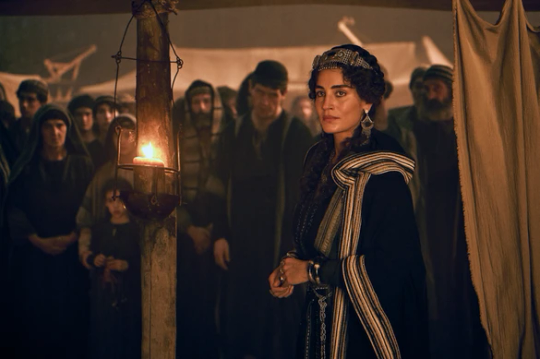
She was married for the first time at a very young age. After this first marriage, Berenice spent some time in Alexandria until her husband's death. While still a young girl, she remarried her uncle, Herod V, King of Chalcis (south-eastern Roman Syria), with whom she had two sons. Widowed again around 48 AD, she married for the third time to Marcus Antonius Polemo II, the client king of Cilicia (in modern Turkey), whom she left to return to her brother Agrippa II in Jerusalem. At his side, she performed the duties of queen, a status that was recognised even though no wife of Agrippa is mentioned in ancient sources.

She became the mistress of Titus, the eldest son of Vespasian, while he was in command of some legions trying to crush all resistance in Galilee (northern Israel) between 67 and 68. Their relationship continued while Titus crushed the Jewish revolt of 66-70, known as the Great Jewish Revolt or the First Jewish-Roman War. Titus returned to Rome to witness his triumph (late 70s) and to help his father. Berenice joined him around 75. Because of negative rumours about the affair, he sent her back to her brother in Jerusalem when he became Princeps in 79.
The charioteer Scorpius - played in the series by Dimitri Leonidas
Flavius Scorpus, also known as Scorpius, was a famous charioteer in Roman times who lived at the end of the first century AD. Scorpus amassed 2,048 victories (that's almost 10 chariot races a week).

As one of the most famous chariot drivers in Roman history, Scorpus earned extraordinary sums of money; his income exceeded that of professional Roman sponsors.
Geographical context
A number of places are used in the series, and some of them have changed names over the course of the story, so here's a short list so that everyone knows where we're talking about:
Some of the characters are from Numidia, which now would be Algeria and part of Libya.
Berenice is from Judea, the kingdom that included Israel, Palestine and part of the modern West Bank.
CASTING
I'm not going to beat around the bush so I'll be quite honest about my feelings. This is just for me, and you are free, of course, to have a different opinion.
One of the main reasons that made me want to watch this series, apart from the subject matter, was the presence in the cast of Anthony Hopkins (Silence of the Lambs, Elephant Man, Dracula, One Life) and Iwan Rheon (Game of Thrones, Misfits, Inhumans). The former, used to very charismatic roles, plays a Roman Princeps, so the casting could hardly have been more dreamy. As for the latter, whom many of you, like me, discovered in Game of Thrones, he plays Tenax, a secret crime boss and owner of the biggest betting tavern in Rome. It's a new role, full of duplicity and manipulation, and I was curious to see how it would differ from his role as Ramsay Bolton. So why not give it a go?

With the exception of them both, the entire cast was unknown to me, at least by name, and sadly I think for many of them, this isn't the show that will showcase their talents. And I'm not necessarily talking about a lack of talent, although some of the performances leave something to be desired, but I'm mainly talking about visibility. The show is packed with so many characters that the main cast of the show is also immense, and the distribution of screen time between each of them leaves them with only meagre moments of appearance per episode.
For my taste, the interpretations of certain characters are either too caricatured or too effete, and this gives the whole thing an unpleasant lack of harmony. In fact, when you go from a very intense scene full of political stakes to a scene of discussion between two pages (this is just an example, but I think it's representative enough), the emotion created by the first disappears and, with it, a large part of the viewer's attention as well.
However, I have to admit that I discovered some talented actors that I didn't know and who deserve to be seen more. I'm thinking in particular of Jojo Macari (Morbius, Sex Education, Harlots), who gives a brilliant performance as the ambitious and manipulative Domitian Flavius, the youngest son of Princeps Vespasian, and also as Aedile Ludi, the person who organises the gladiator fights and chariot races in Rome.

But I'm also talking about Sara Martins (Les Petits Mouchoirs, Petits Meurtres au Paradis, Alexandra Ehle), a French actress who plays Cala, a Numidian merchant and mother of three children - Kwame, Aura and Jula - who does everything she can to free them from the clutches of the Romans.

They're not the only two, of course, but their performances and complex characters contributed greatly in making me want to watch beyond the first episode.
Although the characters played by Anthony Hopkins and Iwan Rheon are both very interesting and their stories could be explored in greater depth. Their presence in the cast isn't enough to make up for the lack of material in the script. It's a flaw I've already mentioned, and I'll come back to it later in the article.

However, I would like to pay tribute to the work of the actors/stuntmen in the race scenes and the arena fights.
THEMES
There are several important themes in the series, and although they are not always tackled with sufficient depth or with a fresh eye, I won't list them all here as it would take far too long. Themes inherent to the genre such as politics, rivalry, but also slavery and arena fights as entertainment are all part of it.

However, I can't help but mention one of the key themes of the genre, and of historical works in general: the exploitation of sex. It's an interesting topic, not only because of the importance of understanding the sexuality of the characters, but also because of their sexualisation. In many works of this kind, when male homosexuality is depicted, it's not so much to show relationships between men as to show the decadence of Rome, whether through fascination or moral condemnation. While male homosexuality is suggested and (self-)censored, this is not the case with female relationships, which are instead shown with voyeuristic force to satisfy a male audience, as in Sapho, Venus of Lesbos (1960) or Sodom and Gomorrah (1962). When the characters are explicitly lesbian, they are portrayed as hating men, and it wasn't until Xena the Warrior in the 1990s that on-screen sapphism was appreciated and reclaimed by lesbian culture.
What I like about the show is that although there are - far too many - carnal relationships between numerous characters, they are mostly brief and often censored by a frame or a well-placed sheet. Sexual vulgarity in the primary sense is not necessary to understand the stakes of the story and therefore doesn't need to take up so much space. However, it is notable that the majority of relationships between characters of opposite sexes almost systematically involve some form of sexual relationship or exploitation, which prevents the creation of the slightest connection between the two genders portrayed.
Another important theme is rivalry, especially political rivalry. Whether it's the relationship between Titus and Domitian as they fight over who will inherit the title of Princeps, the factions trying to seize power from the Flavian dynasty, or the relationship between Roman rulers and their provinces - in this case Numidia and Judea - political rivalry abounds. And yet, for most of the season, I got the impression that none of this was more important to the characters than their choice of dinner.As I said in the casting section, the sheer number of characters leaves too little room for each plot to develop, which is a shame because politics is one of the two main themes of the series. In fact, that's why I was considering watching this series in the first place: to better understand the political stakes behind the Circus Maximus games and, more broadly, to better discover the era of ancient Rome. But here the relationships remain superficial, predictable and therefore, for the most part, rather boring. Nevertheless, as Roland Emmerich himself said when the trailer for the series was released, "So much of it seems relevant in today's society, from the intertwining of politics and sport to the disciplines of the games, which haven't changed much in the last 2,000 years. The most electrifying spectacles for the general public still involve two men in an arena fighting each other, and today's chariots are called racing cars, whose drivers still have accidents and often pay with their lives". And I quite agree, if you look at the dirty tricks played by our politicians - anywhere in the world - the way celebrities are stripped naked as if they were gods, certain aspects of life back then are easily transferable to our times.
Finally, the approach to slavery with Cala's family remains, in my opinion, one of the rare successes of the series. Although certain events remain unlikely for the period, the recruitment of her children into the service of the Roman Empire and their sale into slavery remains plausible. I particularly appreciated the writing of Cala's character, who, as a visibly single and black mother, knows how to use these two characteristics to her advantage in order to manipulate her environment and try to free her children.

She's a strong, determined woman; she doesn't back down until she gets her way, and for once I find it refreshing to see not only a woman fighting to save her family, but to see slaves in a position of strength, all proclivities aside, of course. Speaking about the series, actress Sara Martins - who plays Cala - says: "Narratively, it's a side of Rome we've hardly seen. It's not just about the rich, the patricians, the ruling family and their opponents. It's also about all the workers, the slaves, the wealthy… everything that's behind the curtains of a city like Rome, like all the slaves who built those beautiful buildings. It shows life in Rome at that time and on all social levels". And I agree that through her character's and other's journey, the show gives us a glimpse of that, and it's enjoyable.
PRODUCTION
With a budget of over $150 million for a ten-episode first season, the series marks the first venture into television for German filmmaker Roland Emmerich, known for his disaster films such as Independence Day (1996), Godzilla (1998), The Day After Tomorrow (2004) and 2012 (2009).
Along with Marco Kreuzpaintner (Trade, The Collini Case, The Lazarus Project), with whom he had worked several times in the past, Roland Emmerich had already been commissioned by the American network Peacock back in July 2022. The script was to be written by Robert Rodat (Saving Private Ryan, Thor: The Dark World, Kursk), with whom Roland Emmerich had already worked in 2000 on The Patriot.
But apart from the very ambitious technical aspect, which I'll come back to shortly, the production made a few mistakes which, in my opinion, are very detrimental to the series.
Firstly, the show jumps straight into the action without taking the time to set context, which is very important. The only introduction we get is a short monologue by Iwan Rheon's character, Tenax, who briefly explains how the circus games work and his role in them. As a result, viewers who aren't historians specializing in Ancient Rome - which is frighteningly specific in itself - will lack many of the elements needed to even understand who half of the main characters are and what's at stake politically in the series.
Secondly, the terminology is sometimes historically incorrect, although this may be done to help the viewer understand certain elements. For example, when talking about Andalusian horses, they should have said that they were horses from the Betic region, as it is incorrect to speak of the region of Andalusia 700 years before its creation. In fact, "Al Andalus" - which gave Andalusia its name - originated with the Arab invasions of Spain in the 7th century. At the time of the series, it would have been more accurate to speak of horses from Betica, a region created during the reign of Augustus [63 B.C. - 14 A.D.] by the division of Hispania Ulterior, which at that time covered the south of what is now Spain and roughly corresponded to present-day Andalusia. Its name derives from the Latin name of the Guadalquivir River, Baetis.
Finally, and this is perhaps the thing that annoyed me the most, but I've already mentioned it, is the over-numbering of characters, which drowns out the stories of all the characters, doesn't really bring anyone into the spotlight and loses its own purpose in random, superficial scenes.
Book adaptation

I won't go into too much detail on this, as I haven't read the book, but from what I've been able to skim through and understand from the various analyses of it, Daniel P. Mannix's work seems to cover several centuries of Roman history, and not just the principate of the Flavian dynasty, which may make it a more complete and complex work than the adaptation suggests. Indeed, on the very first page of the book, a single sentence briefly introduces the primary context in which the novel begins, as we are told:
"The situation here is out of control. The emperor is mad, the army is on the verge of mutiny, and the people are dying of hunger. For God's sake, get the sand! We must take their minds off their troubles! - Daniel P. Mannix, Those About to Die, Reed. 2024, p.7.
This only reinforces my feeling that the TV adaptation lacks a crucial introduction to the situation.
SPECIAL EFFECTS
I'd like to delve for a moment on the visual aspect of the series.
The series was filmed at the iconic Cinecittà Studios in Rome. This is one of the largest film studios in Europe and was originally a propaganda machine for Benito Mussolini's fascist government. It has been in operation for almost a century and has been used as the backdrop for classic productions such as Roman Holiday (1953), Ben-Hur (1959) and Cleopatra (1963). In fact, the site has become so popular with American film-makers that it has become known as 'Hollywood on the Tiber'.
The fact that the cast and crew of Those About to Die were able to film in the city where their story was set allowed the show's creators not only to shoot in the Eternal City, but also to immerse themselves in its history while telling a fictionalised version of real events.
"We shot the series in Rome and we're surrounded by buildings built by these emperors. You are constantly surrounded by their legacy. So you can read as much as you want and research as much as you want. But when you go into Domitian's bedroom, which is still on the Palatine Hill, there is nothing like it." said Jojo Macari who plays Domitian.
Of course, the production couldn't necessarily film in the actual bedrooms of Roman statesmen, so ancient Rome had to be recreated through sets and visual effects. The sets for the series were designed by co-production designer Laura Pozzaglio, a native of Italy, who was inspired by archaeological discoveries made in a number of important Italian cities, including Rome, Naples, Pompeii, Ercolano and Oplontis. Together with Johannes Muecke - the production's co-designer - and the production team, they worked with a number of museums to reproduce certain objects for the props. A team of sculptors also reproduced statues from the period and carpenters reproduced furniture they had seen in Pompeii or in history books explained Laura Pozzaglio in the production notes, underlining the effort made to achieve precision.
What could not be achieved in practice was left to visual effects supervisor Peter Travers, who used the Volume LED video wall technology pioneered by The Mandalorian. He explained that the digital wall used was huge: around 51 metres in circumference and eight metres high. It's made up of LED panels and can be stretched infinitely, so even the smallest conversation scenes could have the Colosseum or the skyline of ancient Rome in the background, giving the actors the impression of living in ancient Rome.

And it's true that although the sets - be it the various patrician residences or the outdoor settings such as the Basilica of Julia or the Temple of Vesta - are grandiose in their excess, there's a big problem with the lighting in many scenes. This problem of light contrast is very present throughout the season, and as a result we sometimes can't see what's going on or even the physical reactions of the characters.
There are also problems with the use of special effects. The green screens are sometimes visible in some of the distant shots - particularly the aerial shots of the city at the beginning of the series. And I'll just mention the CGI of the lions, which is absolutely terrible.

However, I must admit that most of the cinematography of the chariot races and gladiatorial fights - particularly in the last two episodes of the season - is quite beautiful, and the photography of the scenes in the Circus Maximus is reminiscent of works such as Ben-Hur. I also think that the athletic realism of the chariot races is due to the fact that the horses were real animals and the races were not digitised. Of course, they were choreographed and stuntmen were hired for the most dangerous scenes, but the actors, including Dimitri Leonidas - who plays the charioteer Scorpus - had to learn to drive a real chariot pulled by real horses. Of this experience, he said :
"Learning the several stages [of racing] before they let us get onto chariots and practice with the chariots was a lot of fun. And then finally when the stunt guys let us on the four-horse chariots to try and learn, the feeling is just incredible. There's nothing like it. Four giant Hungarian horses going all out. It's like riding an earthquake. It's hard to describe, to be honest. All I can say is those guys that do it, the stunt guys and then the guys like Scorpus who actually raced, you'd have to be insane. It's completely bonkers what they're doing. [...] I didn't go that fast except for one moment where we were sort of training and the horses decided they wanted to race and I just got dragged along. There's a great photo, actually, one of our set photographers took just as the horses went, and you can see me and one of the other actors just trying our best to stop them as we hit the turn on Circus Maximus. And he said to me that he stopped taking photos because he thought something bad was going to happen. To be fair, I was on the chariot and I thought something bad was going to happen. But that's why you do all that training. You have to just train as much as you can, hope that everything goes smoothly, but then trust that if something does go wrong, you know the protocols and you know how to make it safe. But I'm glad I got to experience it because that was the only time really that I got to feel them go full pelt was when I wasn't expecting it. And it's wild. It's completely wild. And gave me a newfound sort of respect for Scorpus and all those guys that were doing it." - Dimitri Leonidas in an interview for NBC on July 12th, 2024.


The colouring of the series is also of high quality. They make up for a lot of empty moments in the plot by captivating the viewer's eye with grandiose imagery, which, combined with the spectacular sets and opulent costumes, is one of the show's few strengths in my opinion.
COSTUMES
My penultimate stop is the costumes! This is one of the great strengths of the series, and one that I have no criticism for: the costumes in this series are breathtaking! Under the supervision of Gianni Casalnuovo as head costume designer, not only the characters' outfits, but also the armours are of the highest quality. With the help of costume supplier Peris Costumes - which is based in Spain but also has a branch in Rome - the production team had access to rare, high-quality pieces that were tailored to fit the needs of the show. No stranger to film and television sets, Peris Costumes has also worked on projects such as Gladiator II and House of the Dragon. Together they have created a costume collection that faithfully reflects the opulence and grandeur of the great age of Rome.
The only downside would be the blood splatters, prosthetics of severed limbs and gashes in the gladiators' flesh which at times look crude, but in the heat of the action are almost negligible details.
MUSIC
The soundtrack of the series, composed by Andrea Farri, is quite interesting and epic enough to seduce the viewer. However, if you listen to the music outside of the episodes, you won't always be reminded of ancient Rome. Nevertheless, the violin and cello compositions are very beautiful and will appeal to music lovers, even if they do not match the instruments of the time, as the violin and cello were only invented in the 16th century.
What's more, the work on the show's theme music - which depicts rivers of blood running down the streets of Rome and its emblematic monuments - is reminiscent of many of the show's themes in recent years: Game of Thrones, House of the Dragon, Westworld and more. Set to music by Woodkid, the epic status announced by the show's synopsis is truly palpable.
CONCLUSION
Despite having called on some big names for this series, it leaves a bitter taste in my mouth. While the superb costumes and some of the sets may appeal, the lack of any real depth to the story leaves room for the clichés of the genre, which have already been exploited far too often. Even the presence of Anthony Hopkins isn't enough to restore the reputation of this epic, which is fantastic in name only…
I won't go through the whole review again, I think it's self-explanatory enough for you to understand that this series was a big disappointment for me. Although peplums are far from my favourite genre, I was looking forward to another chance to be proved wrong, to learn more about an era I know so little about, and what's more with Anthony Hopkins and Iwan Rheon in the cast! Well, what I'll take away from this is yet another disappointment that has the bitter taste of time wasted…
I was expecting the exploitation of the games to highlight the political issues of the time and this is partly achieved. However, I think they could have emphasised the politics and toned down the sexualisation of the characters. Perhaps this is due to the period chosen, which is not the most eventful in history? Perhaps another period of the Roman Empire would have been more suitable for a series?
So I won't be going to the cinema today to see the next Gladiator, and I almost hope that Amazon doesn't renew this series, because there's nothing really at stake in this dull story. It would save everyone time and money… If they do decide to renew it, maybe they'll choose to do a temporal ellipse and focus on a period where the stakes are potentially higher. They had the opportunity to diversify and innovate with the peplum genre and, in the end, they chose to stick with the outdated clichés it's full of. Hopefully this is a mistake they won't make again if the show is renewed for a second series.
That's all I have to say about Those About to Die. I hope that those who have made this choice will still be curious enough to give it a try, if only to see for themselves. Maybe you won't be as picky as I am?
I'd like to give a special thanks to my partner, who watches all these series with me. She proofreads each article, supports me and, especially for this one, was my historical advisor, as this is her field of study.
Until the next article, I hope you enjoy your viewing, have a great week and see you soon on Instagram (@theaddictedwatcherreviews) to choose the next article!
Eli
#tv show#review#adaptation#those about to die#daniel p mannix#prime video#Iwan Rheon#Sara Martins#Tom Hughes#Jojo Macari#Moe Hashim#Jóhannes Haukur Jóhannesson#Rupert Penry-Jones#Gabriella Pession#Dimitri Leonidas#Emilio Sakraya#David Wurawa#Pepe Barroso#Gonçalo Almeida#Eneko Sagardoy#Lara Wolf#Anthony Hopkins#music#Andrea Farri#Woodkid#Rome#ancient rome#vespasian#circus maximus#peplum
11 notes
·
View notes
Text
H!P M3 Grand Prix '23 ~Weeks of October~

If you oshi anyone seen here, be sure to participate! Details can be found in the link below.
Subscribe to the main blog | Social Media + RSS Links | M3 Grand Prix page | Birthday List + Oshi Poll
#Hello! Project#Jpop#J-Pop#Magic Morning Meteora#Hello Pro M3 Grand Prix#H!P M3 Grand Prix#M3 Grand Prix#Morning Musume#Nonaka Miki#ANGERME#Kamikokuryo Moe#BEYOOOOONDS#Takase Kurumi#Kitagawa Rio#Fukumura Mizuki#Goto Maki#Tanaka Reina#Takahashi Ai#Sato Masaki
30 notes
·
View notes
Text
youtube
Those About to Die Teaser
Set in ancient Rome during the reign of Emperor Vaspasian, Those About to Die explores the "dirty business of entertaining the masses, giving the mob what they want most…blood and sport." (Peacock)
Those About to Die is based on the novel by Daniel P/ Mannix. The series stars Anthony Hopkins (Emperor Vaspasian), Iwan Rheon, Sara Martins, Tom Hughes, Jojo Macari, Moe Hashim, Jóhannes Haukur Jóhannesson, David Wurawa, Pepe Barroso, Gonçalo Almeida, Rupert Penry-Jones, Gabriella Pession, Dimitri Leonidas, Emilio Sakraya, Eneko Sagardoy, and Romana Maggiora Vergano. Roland Emmerich and Marco Kreuzpaintner each directed five episodes.
Those About to Die hits Peacock on July 18, 2024.
#those about to die#daniel p mannix#anthony hopkins#iwan rheon#sara martins#tom hughes#jojo macari#moe hashim#johannes haukur johannesson#david wurawa#pepe barroso#goncalo almeida#rupert penry jones#gabriella pession#dimitri leonidas#emilio sakraya#eneko sagardoy#romana maggiora vergano#roland emmerich#marco kreuzpaintner#peacock#TGCLiz#Youtube
15 notes
·
View notes
Text

last one for the rest of my life (bcs art block probs)
drew characters based on the song album art
face close-ups




#fanart#sketch#traditional art#hatsune miku#utsu p#happy pills#luluyam#divine ceo#moe shop#gumi#love taste#kasane teto kinda#sodikken#nothing man#people eater#misery meat#yeah#artists on tumblr#jllnbsll
6 notes
·
View notes